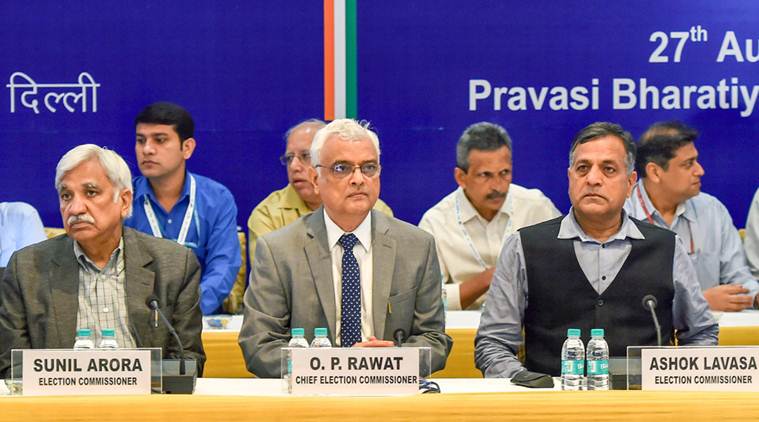
All parties barring BJP want election expenditure capped
New Delhi: All major parties barring the BJP pushed for a cap on election-related expenses by parties, saying only this can ensure a level playing field.
It is learnt that the issue of funding of political parties and whether there should be a limit on the amount of money that parties can spend during an election became one of the key discussion points at an all-party meeting organised Monday by the Election Commission of India (ECI).
BJP general secretary Bhupendra Yadav, who, along with Union Minister J P Nadda, represented the ruling party at the meeting, told The Indian Express that since all political parties have to declare their expenditure in their income tax filings, “usmein kisi prakaar ki capping nahi lagai jaani chahiye (there should be no cap on that)”.
Yadav said elections should be based on issues, and not on caste lines or “muscle power” or “criminal power”. The parties, he said, “should not be restricted”, rather “usmein zyaada se zyaada prachaar karne ka avsar aur suvidha deni chahiye(parties should be given more opportunities and facilities to advertise)”. He said there should be transparency in “crowd-funding”. In a statement, the BJP said “ECI may moot for better transparency than limit the expenses”.
The Congress, though not as vocal as smaller and regional parties, did not object to spending caps. The Congress was represented by Mukul Wasnik and Mohammad Khan.
Wasnik said his party supports the idea, but for it a “formula can be worked out on how this can be done”. Later in the day, the party issued a statement saying it “wholeheartedly welcomes” the proposed amendment to limit “party expenditure by maintaining an overall party expenditure ceiling by multiplying the per candidate expenditure ceiling with the number of candidates fielded”.
Other parties were more vocal, pointing out that unlimited spending by parties distorts the level-playing field during elections. Supporting the idea of a cap, Danish Ali of Janata Dal (Secular) pointed out that all parties, except one, were on “consensus” on the issue. He told The Indian Express that he had even requested the Chief Election Commissioner (CEC) to address it in his concluding remarks.
Speaking to reporters after the meeting, CEC O P Rawat said “several parties said that there should be a ceiling on the expenditure” and there were other views about enforcing the current rules, so that the “level-playing field is maintained”. Rawat said that if it can be done legally, “then Commission will take a call on it”.
More than 40 parties, including seven national parties, were present at the meeting.
AAP’s Raghav Chadha said that funding of polls, “how one political party has unlimited amount of resources, how that should be looked into,” was part of the party presentation. He said the issue of an overall limit on party expenditure was raised by a “lot of political parties”.
“You cannot have that X candidate is spending only 5 lakh rupees but the BJP or Congress or whichever party is spending 500 crore in that constituency,” Chadha said, adding that the “entire election process gets vitiated, and there’s no level-playing field”.
The AAP leader also said “foreign companies through electoral bonds can fund political parties, that has serious national security implications”. The same issue was also mentioned by CPM’s Nilotpal Basu.
Proposing a more drastic change, AIADMK’s M Thambidurai mentioned “state funding” of elections. This, he said, “very important, to avoid all malpractices” and “misuse” of corporate companies “to raise funds for political parties”.
The other major point of contention during the all-party meet was that of malfunctioning Electronic Voting Machines (EVMs). Several parties voiced their concerns — this was not shared by the BJP.
The parties said there should be a fixed number of Voter Verified Paper Audit Trail (VVPAT) machines that must be audited to ensure the fidelity of elections. Till this was not possible, the Congress said, elections should be conducted via paper ballot. But not all Opposition parties were in favour of moving back to paper ballot, even if they joined the Congress in asking for VVPAT audits to “strengthen” the electoral process.
Wasnik said that “if EVM is not going to be the answer to reflect the will of the people then there is need to go back to ballot paper”. He said that “to a large extent” it has been noticed that “whichever button you press on the vote is getting registered in the name of a particular political party”. The Congress demanded that “30 per cent of VVPAT, minimum of that, should be cross-checked and verified”. On EVMs, it said all stakeholders should be informed where the “chips of the EVM are procured from”.
Responding to Congress concerns on EVMs, BJP’s Bhupendra Yadav said that when Congress wins elections using EVMs in Punjab, “then they like it”, but when they lose, then “they say the EVMs are at fault”. He said that the problem is not in the EVMs, but in the own thoughts of the Congress. He said Constitutional bodies don’t work as per the “comfort” of one party.
CEC Rawat said that the all-party meeting is an annual feature and it is “customary to hold the all-party meeting and take their suggestions so that we can take a call on all those and revamp the system”.

Comments are closed.